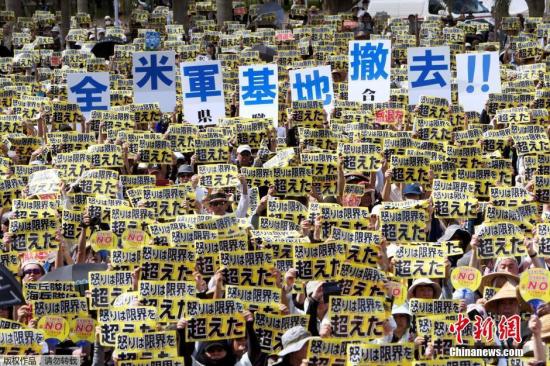China News Service, November 18th. According to Kyodo News Agency of Japan, the Japanese government has begun coordination in the direction of agreeing to a certain extent to the US's increase in the funding burden of the US troops stationed in Japan from 2022.
Data map: On June 19, 2016, a large-scale rally was held in Okinawa Prefecture, Japan, requesting all the US Marines stationed in Okinawa to leave, and fundamentally revising the agreement to grant judicial asylum privileges to the US troops stationed in Japan.
According to reports, the Japanese side intends to increase funds for the improvement of the airport used by the Self-Defense Forces and the US military and joint training, instead of the original burden of the US military bases such as water, electricity, and gas fees. The US has already inquired about its intentions.
The Japanese government believes that if it is such an increase, it will help strengthen the alliance and easily gain public understanding.
The two sides are in the final stage of negotiations, and strive to reach an agreement in December and sign a special agreement early next year.
Relevant government officials disclosed the news on the 17th.
The 2021 budget includes 2017 billion yen Japanese burden, including water, electricity and gas, Japanese staff salaries, training transfer fees, etc.
Although the amount requested by the U.S. has not been disclosed to the public, Japanese diplomatic sources believe: "The burden on the (Japanese side) will increase, but it will probably not be the huge burden requested by the former Trump administration in the United States. In the end, Prime Minister Fumio Kishida Lo."
Regarding the increase in joint training, etc., Japan and the United States will discuss whether to establish new projects in the special agreement.
The validity period of the agreement is the same as in the past, which is set at five years to 2026.
During the negotiations, the United States seemed to list a variety of regional security factors that have contributed to the increase in the importance of the US military stationed in Japan, as a reason for requesting Japan to increase its burden.
The Japanese side informed that the financial situation is severe and it is difficult to increase significantly.
The governments of Japan and the United States held staff consultations in Washington in early August and officially started negotiations.
As Japan will finalize the 2022 budget at the cabinet meeting in late December, it strives to negotiate before then.
Regarding the signing of the special agreement, some people proposed to take the opportunity of the "Japan-US Security Consultative Committee" (2+2) attended by the Minister of Foreign Affairs and Defense to sign it by Foreign Minister Lin Fangzheng.
2+2 is expected to be held within this year, but it may also be postponed to the beginning of next year.
The current special agreement expired in March this year, but because the negotiation period coincided with the US presidential election and the handover of power last fall, after the Biden administration took office in January this year, Japan and the US reached an agreement to extend it for one year.
Regarding after 2022, the two parties have agreed to reopen negotiations in order to conclude an agreement covering multiple years.

